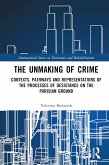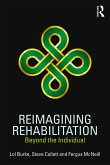72,95 €
72,95 €
inkl. MwSt.
Sofort per Download lieferbar

36 °P sammeln
72,95 €
Als Download kaufen

72,95 €
inkl. MwSt.
Sofort per Download lieferbar

36 °P sammeln
Jetzt verschenken
Alle Infos zum eBook verschenken
72,95 €
inkl. MwSt.
Sofort per Download lieferbar
Alle Infos zum eBook verschenken

36 °P sammeln
- Format: PDF
- Merkliste
- Auf die Merkliste
- Bewerten Bewerten
- Teilen
- Produkt teilen
- Produkterinnerung
- Produkterinnerung

Bitte loggen Sie sich zunächst in Ihr Kundenkonto ein oder registrieren Sie sich bei
bücher.de, um das eBook-Abo tolino select nutzen zu können.
Hier können Sie sich einloggen
Hier können Sie sich einloggen
Sie sind bereits eingeloggt. Klicken Sie auf 2. tolino select Abo, um fortzufahren.

Bitte loggen Sie sich zunächst in Ihr Kundenkonto ein oder registrieren Sie sich bei bücher.de, um das eBook-Abo tolino select nutzen zu können.
This text presents the foundations of correctional treatment and intervention, including overviews of the major therapeutic modalities that are effective when intervening with justice-involved individuals to reduce ongoing system involvement and improve well-being.
- Geräte: PC
- mit Kopierschutz
- eBook Hilfe
Andere Kunden interessierten sich auch für
![Correctional Counseling and Rehabilitation (eBook, ePUB) Correctional Counseling and Rehabilitation (eBook, ePUB)]() Emily J. SalisburyCorrectional Counseling and Rehabilitation (eBook, ePUB)72,95 €
Emily J. SalisburyCorrectional Counseling and Rehabilitation (eBook, ePUB)72,95 €![The Unmaking of Crime (eBook, PDF) The Unmaking of Crime (eBook, PDF)]() Valerian BenazethThe Unmaking of Crime (eBook, PDF)43,95 €
Valerian BenazethThe Unmaking of Crime (eBook, PDF)43,95 €![Effective Threat Management (eBook, PDF) Effective Threat Management (eBook, PDF)]() Frederick S. CalhounEffective Threat Management (eBook, PDF)33,95 €
Frederick S. CalhounEffective Threat Management (eBook, PDF)33,95 €![Reimagining Rehabilitation (eBook, PDF) Reimagining Rehabilitation (eBook, PDF)]() Lol BurkeReimagining Rehabilitation (eBook, PDF)41,95 €
Lol BurkeReimagining Rehabilitation (eBook, PDF)41,95 €![Rehabilitation Work (eBook, PDF) Rehabilitation Work (eBook, PDF)]() Hannah GrahamRehabilitation Work (eBook, PDF)51,95 €
Hannah GrahamRehabilitation Work (eBook, PDF)51,95 €![The Journey from Prison to Community (eBook, PDF) The Journey from Prison to Community (eBook, PDF)]() The Journey from Prison to Community (eBook, PDF)34,95 €
The Journey from Prison to Community (eBook, PDF)34,95 €![Trusting Recovery and Desistance (eBook, PDF) Trusting Recovery and Desistance (eBook, PDF)]() Lauren HallTrusting Recovery and Desistance (eBook, PDF)43,95 €
Lauren HallTrusting Recovery and Desistance (eBook, PDF)43,95 €-
-
-
This text presents the foundations of correctional treatment and intervention, including overviews of the major therapeutic modalities that are effective when intervening with justice-involved individuals to reduce ongoing system involvement and improve well-being.
Hinweis: Dieser Artikel kann nur an eine deutsche Lieferadresse ausgeliefert werden.
Dieser Download kann aus rechtlichen Gründen nur mit Rechnungsadresse in A, B, BG, CY, CZ, D, DK, EW, E, FIN, F, GR, HR, H, IRL, I, LT, L, LR, M, NL, PL, P, R, S, SLO, SK ausgeliefert werden.
Hinweis: Dieser Artikel kann nur an eine deutsche Lieferadresse ausgeliefert werden.
Produktdetails
- Produktdetails
- Verlag: Taylor & Francis eBooks
- Seitenzahl: 410
- Erscheinungstermin: 17. Mai 2022
- Englisch
- ISBN-13: 9781000530629
- Artikelnr.: 64061200
- Verlag: Taylor & Francis eBooks
- Seitenzahl: 410
- Erscheinungstermin: 17. Mai 2022
- Englisch
- ISBN-13: 9781000530629
- Artikelnr.: 64061200
- Herstellerkennzeichnung Die Herstellerinformationen sind derzeit nicht verfügbar.
Emily J. Salisbury, Ph.D., is an Associate Professor and the Director of the Utah Criminal Justice Center at the University of Utah College of Social Work. She is trained as an applied criminologist and focuses her research on the science of correctional treatment interventions, particularly among system-involved women. The Utah Criminal Justice Center is an interdisciplinary research center that provides organizations with research, training, and technical assistance grounded in scientific evidence to prevent and reduce crime and victimization among all communities, with an understanding that approaches must be tailored to the contextual needs of organizations and the diverse populations they serve.
Dr. Salisbury's research focuses on correctional policy, risk/needs assessment, and treatment intervention strategies, with a particular focus on system-involved women, gender-responsive practices, and trauma-responsive care. As a result of her scholarship on behalf of women, she was awarded the Marguerite Q. Warren and Ted B. Palmer Differential Intervention Award from the American Society of Criminology Division on Corrections and Sentencing.
Patricia Van Voorhis, Ph.D., is Professor Emerita of Criminal Justice at the University of Cincinnati. Dr. Van Voorhis has published extensively, including two books and many articles in the leading criminology and criminal justice journals. She has provided expertise to federal, state, and local agencies on topics pertaining to correctional effectiveness, program implementation, evaluation techniques, women offenders, risk assessment, and correctional classification. She has directed numerous federal- and state-funded research projects on inmate classification, gender-responsive assessment, program implementation, and cognitive behavioral interventions, and continues to pursue a rigorous consulting and research agenda in retirement. Dr. Van Voorhis is the recipient of many awards, including the prestigious American Society of Criminology August Vollmer Award, which recognizes a criminologist whose research scholarship has contributed to justice or to the treatment or prevention of criminal or delinquent behavior.
Dr. Salisbury's research focuses on correctional policy, risk/needs assessment, and treatment intervention strategies, with a particular focus on system-involved women, gender-responsive practices, and trauma-responsive care. As a result of her scholarship on behalf of women, she was awarded the Marguerite Q. Warren and Ted B. Palmer Differential Intervention Award from the American Society of Criminology Division on Corrections and Sentencing.
Patricia Van Voorhis, Ph.D., is Professor Emerita of Criminal Justice at the University of Cincinnati. Dr. Van Voorhis has published extensively, including two books and many articles in the leading criminology and criminal justice journals. She has provided expertise to federal, state, and local agencies on topics pertaining to correctional effectiveness, program implementation, evaluation techniques, women offenders, risk assessment, and correctional classification. She has directed numerous federal- and state-funded research projects on inmate classification, gender-responsive assessment, program implementation, and cognitive behavioral interventions, and continues to pursue a rigorous consulting and research agenda in retirement. Dr. Van Voorhis is the recipient of many awards, including the prestigious American Society of Criminology August Vollmer Award, which recognizes a criminologist whose research scholarship has contributed to justice or to the treatment or prevention of criminal or delinquent behavior.
Part I: A Professional Framework for Correctional Counseling
1: The Process of Correctional Counseling and Treatment
2: Understanding the Special Challenges Faced by the Correctional Counselor
3: Community Corrections Officers as Change Agents
4: Correctional Treatment: Accomplishments and Realities
Part II: Correctional Assessment, Diagnosis, Classification, and Case Planning
5: Assessment and Diagnosis of Correctional Clients
6: An Overview of Correctional Classification Systems
7: Case Planning and Case Management
Part III: Contemporary Approaches for Correctional Counseling and Treatment
8: Behavioral Interventions
9: Cognitive Interventions
10: Social Learning Interventions
11: Family Interventions
Part IV: Effective Correctional Interventions for Special Populations
12: Treating Clients with Substance Abuse
13: Treating System-Involved Women
14: Treating Clients who Commit Sex Offenses
15: Treating Clients with Severe Antisocial Behavior and Psychopathy
1: The Process of Correctional Counseling and Treatment
2: Understanding the Special Challenges Faced by the Correctional Counselor
3: Community Corrections Officers as Change Agents
4: Correctional Treatment: Accomplishments and Realities
Part II: Correctional Assessment, Diagnosis, Classification, and Case Planning
5: Assessment and Diagnosis of Correctional Clients
6: An Overview of Correctional Classification Systems
7: Case Planning and Case Management
Part III: Contemporary Approaches for Correctional Counseling and Treatment
8: Behavioral Interventions
9: Cognitive Interventions
10: Social Learning Interventions
11: Family Interventions
Part IV: Effective Correctional Interventions for Special Populations
12: Treating Clients with Substance Abuse
13: Treating System-Involved Women
14: Treating Clients who Commit Sex Offenses
15: Treating Clients with Severe Antisocial Behavior and Psychopathy
Part I: A Professional Framework for Correctional Counseling
1: The Process of Correctional Counseling and Treatment
2: Understanding the Special Challenges Faced by the Correctional Counselor
3: Community Corrections Officers as Change Agents
4: Correctional Treatment: Accomplishments and Realities
Part II: Correctional Assessment, Diagnosis, Classification, and Case Planning
5: Assessment and Diagnosis of Correctional Clients
6: An Overview of Correctional Classification Systems
7: Case Planning and Case Management
Part III: Contemporary Approaches for Correctional Counseling and Treatment
8: Behavioral Interventions
9: Cognitive Interventions
10: Social Learning Interventions
11: Family Interventions
Part IV: Effective Correctional Interventions for Special Populations
12: Treating Clients with Substance Abuse
13: Treating System-Involved Women
14: Treating Clients who Commit Sex Offenses
15: Treating Clients with Severe Antisocial Behavior and Psychopathy
1: The Process of Correctional Counseling and Treatment
2: Understanding the Special Challenges Faced by the Correctional Counselor
3: Community Corrections Officers as Change Agents
4: Correctional Treatment: Accomplishments and Realities
Part II: Correctional Assessment, Diagnosis, Classification, and Case Planning
5: Assessment and Diagnosis of Correctional Clients
6: An Overview of Correctional Classification Systems
7: Case Planning and Case Management
Part III: Contemporary Approaches for Correctional Counseling and Treatment
8: Behavioral Interventions
9: Cognitive Interventions
10: Social Learning Interventions
11: Family Interventions
Part IV: Effective Correctional Interventions for Special Populations
12: Treating Clients with Substance Abuse
13: Treating System-Involved Women
14: Treating Clients who Commit Sex Offenses
15: Treating Clients with Severe Antisocial Behavior and Psychopathy







